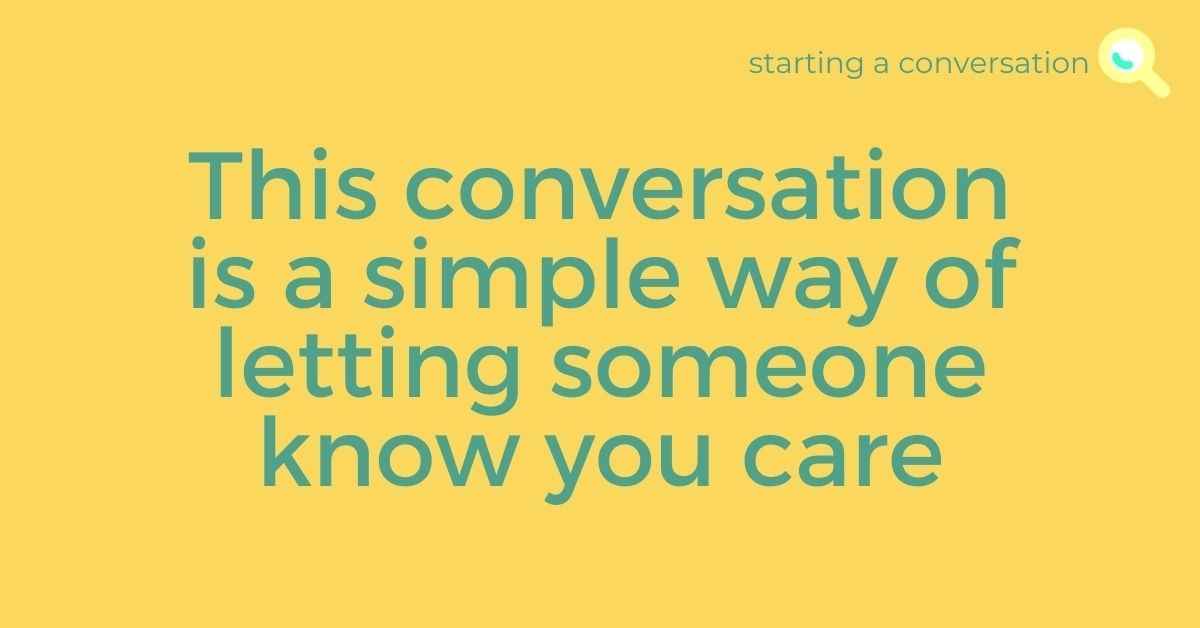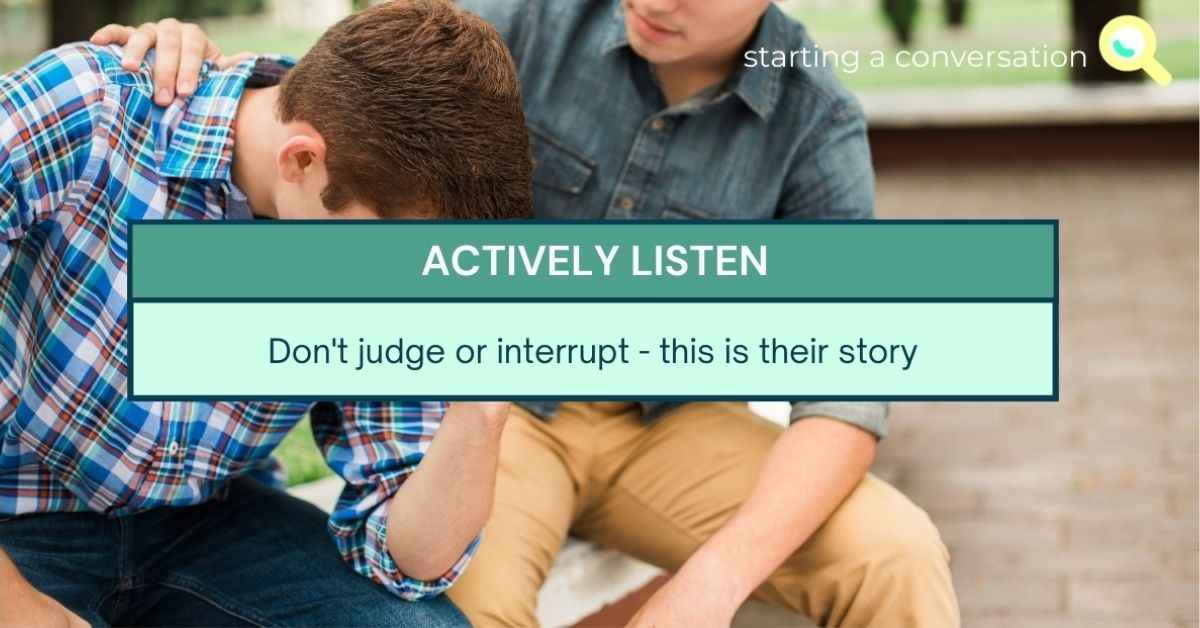Reviewed By Cara Swanston - Registered Member MBACP Adv. Dip.
How to Start a Conversation
29 April 2021
Have you noticed a friend or family member behaving differently? Are they not seeming like their usual self? It might be time to have a conversation with them about their mental health.
Have you noticed a friend or family member behaving differently? Are they not seeming like their usual self? It might be time to have a conversation with them about their mental health.
When it comes to someone you know or love, it’s easy to become worried when things seem out of sorts. If their behaviour has changed, it could be a sign they need some help to get back on track.
Starting a conversation about someone’s mental health may feel daunting or uncomfortable and a good thing to remember is that you don’t need to be a doctor or a mental health professional to talk with someone about how they’re feeling. Having a conversation is often a first step in encouraging a friend or family member to seek support or get the help they need.
After all, this kind of conversation is a simple way of letting someone know you care, which can make a big difference to how they’re feeling. Being there for someone when they need it most can really help.

Knowing when a conversation is needed
Spotting the signs that someone in your life isn’t their usual self is the starting point towards having a conversation to see if they’re ok. Keep an eye on how they’re doing, making sure to look out for the tell-tale signs that mean you’re right to feel worried.
Prepare for the conversation
Once you know it’s time to speak with someone, it can be helpful to find out what help is available locally. Browse our directory to see what support services are available in their area. Knowing what support’s out there can help make your conversation even more productive.
Pick your timing wisely
Location and time is everything when it comes to planning your conversation. Think about the best time and place, taking into account the kind of day or week they’ve had. If you know someone’s had a stressful work week or problems at home, time your conversation for when they’re feeling more relaxed.
Some tips for choosing the right environment:
- Spend some time doing an activity they enjoy first, whether that’s sports, going to the park or visiting the beach
- Catch up over a coffee, either at home or grab a takeaway drink to go for a walk
- Go for a scenic drive; the lack of eye contact on drives can help people open up more readily

Starting the conversation
Before you start, make sure you feel calm, ready to listen and remember body language and tone of voice are important.
You can start by simply saying how they don’t seem like their usual selves and you can offer examples of changes in their mood or behaviour.
Some phrases to get the conversation started:
- You don’t seem like yourself, is everything ok?
- You seem to have a lot on your mind lately. Is there anything going on?
- You seem [describe behaviour or mood change] – is there anything you’d like to talk about?
Ask open-ended questions
Once they start to share their feelings or experience, give them time to talk through what they’re feeling. When someone’s mental health is a problem, they might not feel ready to talk about their situation. You can help by asking open-ended questions, where they can explore their thoughts, instead of replying with “yes” or “no”.
Be patient with them and try not to predict their situation or make assumptions. Let them finish their sentences without interrupting and hold any comments or questions until they’ve finished speaking. Asking questions can help you understand what they’re going through. Such as:
- “How has this [experience/feeling] been affecting you?”
- “How long have you been feeling like this?”
- “I understand how tough that’s been for you. Can you tell me more so I can understand?”

Creating a safe space
There’s no right or wrong way to speak with someone you know about something they’re experiencing, just be yourself and remember this is their story. Your conversation is to try and encourage them to explore what they’re feeling and to understand whether or not they need support to make the situation better.
You can encourage a safe talking space by saying things like:
- “Take your time, there’s no rush.”
- “I know this can be difficult to talk about and I’m here for you.”
- “It sounds like you’ve been going through a lot.”
- “I’m here for you.”
Actively listen
Having the conversation with someone about their mental health isn’t about having the answers to their problem. It’s about listening and showing that you’re there for them by knowing when is the right time to stay silent and actively listen.
Tips for active listening & responding:
- Nod your head to show you’re listening and understanding
- Encourage the conversation by saying things like “what happened next?” or “how did that impact you?”
- Repeat back your understanding of what they said by paraphrasing – this helps reinforce your listening skills and shows your interest.

Take their feelings seriously
Let them know you appreciate them sharing what they’re going through and acknowledge how hard it can be to share your feelings in this way. It can help to take the approach of you and them versus the problem – your support in this way will help them build confidence in figuring their problem out. Be sure to ask what you can do to make things better and let them know whatever they tell you is in privacy.
Knowing you can’t fix things with one conversation, but that you can help them in taking steps forward, means offering your support and asking how you can help. Remind them that they can find local support organisations through Find Help NI.
Don’t be afraid to ask twice
Sometimes people aren’t ready to open up about how they’re feeling straight away and that’s ok. You can leave the conversation with the message that you’re there for them and that you care.
If days or weeks pass and their behaviour doesn’t change – or gets worse – try picking up the conversation a second time. Asking how someone really is and making space to listen to them can hugely help someone address what they’re going through.
Get Inspired Further
Vagus Nerve 3 Way Breath
A great exercise for enhancing vagal tone and initiating the relaxation/parasympathetic response reducing feelings of anxiety and overwhelm.
understanding self harm
If you’re self-harming, you don’t have to go through this alone, you can get the right support to improve your wellbeing.
cbt what is it
Cognitive Behavioural Therapy (CBT) is a form of psychotherapy that looks at how you think about yourself, the world and other people by looking at how your actions affect your thoughts and feelings.



